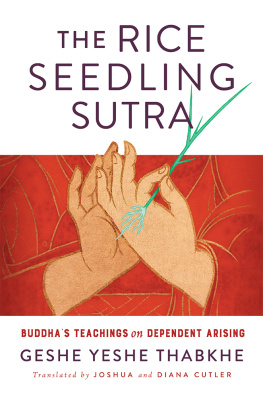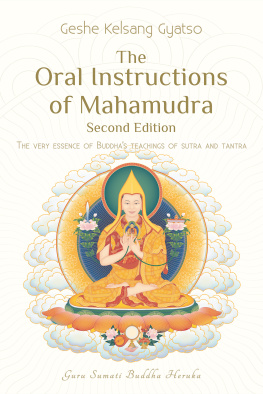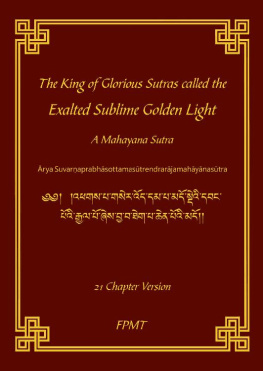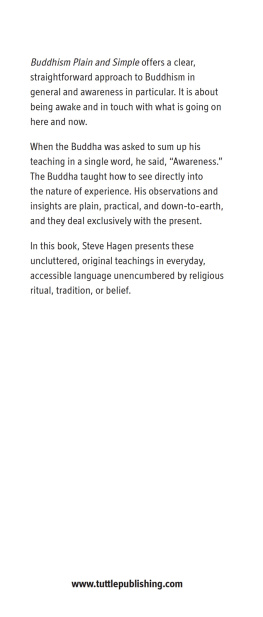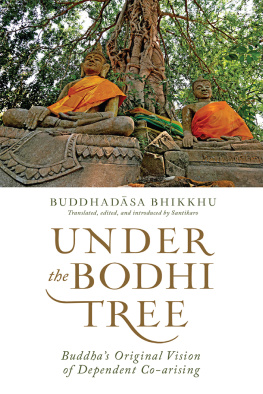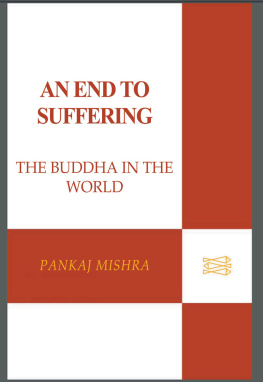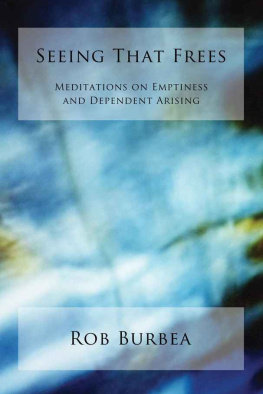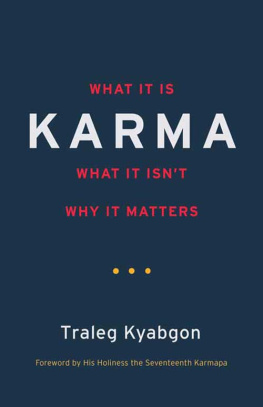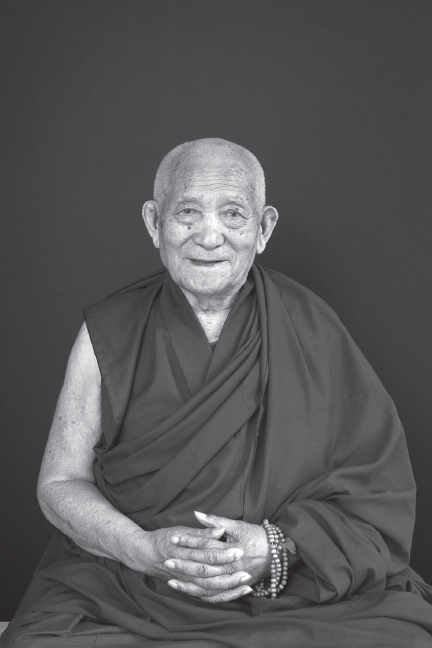Dependent arising, one of the Buddhas most profound teachings, is brought to life in this lucid commentary on the Rice Seedling Sutra by Geshe Yeshe Thabkhe, one of the greatest living scholars of the Tibetan tradition.
Jos Ignacio Cabezn, Dalai Lama Professor of Tibetan Buddhism and Cultural Studies, UC Santa Barbara
Geshe Yeshe Thabkhe is the most eminent Tibetan scholar of Buddhist philosophy of the past century. His studies of Madhyamaka thought are peerless in their depth, clarity, and insight. Geshe-las commentary on the Rice Seedling Sutra exemplifies his precise, profound, yet entirely accessible commentarial style, making the purport of this sutra immediately available to the reader and demonstrating the power of a great commentary. This text has much to offer to practitioners, beginning students, and advanced scholars alike.
Jay L. Garfield, Doris Silbert Professor in the Humanities, Smith College, and the Harvard Divinity School
Preface
The seed of the present book was planted when I started a Hindi translation of the great Indian scholar Kamalalas commentary on the Rice Seedling Sutra (listamba Stra), which was published in 2010. For this publication I also wrote an introduction in Tibetan. The title I gave my introduction was Dependent Arising, the King of Reasons Used to Distinguish the Ontological Status of All Things (Gnas lugs byed pai rigs pai rgyal po). Usually an introduction would not require a title, but I wanted to emphasize the importance of the subject matter, dependent arising. I composed it as a commentary on the meaning of the sutra, not as a commentary on its words.
In the Rice Seedling Sutra, the Buddha explains to riputra how things arise based on multiple causes and conditions. Likewise, the present work could not have come about without the contributions of many individuals. When I was working on the Hindi publication, I gave an explanatory reading of the Tibetan introduction to Joshua and Diana Cutler while residing at their Dharma center, the Tibetan Buddhist Learning Center in Washington, New Jersey. They in turn drafted an English translation based on my explanation, and Dr. Amy Miller edited their work. Loseling Geshe Dadul Namgyal contributed his English translation of two parts of the introduction and later offered his editing suggestions for the entire translation. Venerable Thubten Chodron, abbess of Sravasti Abbey in Newport, Washington, also edited the entire text, and she encouraged me to publish the translation because she noted that there is no such explanation in English of the Buddhas core teaching of dependent arising accompanied by many citations of original sources. I wish to thank them all for their help and encouragement.
When the manuscript of this English translation was almost ready to show a publisher, I thought that it needed a translation of the Rice Seedling Sutra to make it complete. As I was told that Jeffrey Schoening had already done an authoritative translation, I asked him if he would be willing to publish his translation along with my introduction. He agreed after determining that he would retranslate the sutra so that it was more appropriate for a general audience, taking my introductions English translation into consideration. His revised translation begins this book.
A discourse on the Buddhas teachings traditionally begins by praising the source of the teachings, promising to compose the text, and stating the purpose of composing the text. Thus I began my introduction with the following verses of homage and intention:
You who taught dependent arising through your own understanding,
refuting the view of a divine creator of the world
and clarifying the correct mundane view and four seals,
O Supreme Master, please look after me always.
Though I have weak mental fortitude to analyze precisely
the meaning of the Rice Seedling Sutra spoken by that Master,
as I wish to be a fortunate person,
I will enthusiastically endeavor to offer this short introduction.
I did not compose this to show to scholars
nor to expand on the study of logic in the monasteries.
In hopes of assisting a few beginners,
I earnestly set forth this simply worded introduction to the best of my ability.
The Rice Seedling: A Mahayana Sutra
Translated by Jeffrey D. Schoening
The title in Sanskrit: rya-listamba-nma-mahyna-stra
The title in Tibetan: Phags pa s lu ljang pa zhes bya ba theg pa chen poi mdo
Homage to all the buddhas and bodhisattvas!
Thus I heard on one occasion when the Blessed One was staying at Rjagha on Vulture Peak Mountain together with a great assembly of monks, 1,250 monks, and very many bodhisattva great beings.
At that time the Venerable riputra went to the promenade of Maitreya, the bodhisattva great being. On his arriving they exchanged many pleasantries, and having met, they sat together on a stone slab. Then the Venerable riputra said this to the bodhisattva great being Maitreya, Maitreya, here today the Blessed One, after looking at a rice seedling, spoke this sutra to the monks, Monks, he who sees dependent arising sees the Dharma; he who sees the Dharma sees the Buddha. After saying that, the Blessed One said nothing more. Maitreya, what is the meaning of that sutra spoken by the Sugata? What is dependent arising? What is the Dharma? What is the Buddha? How does one see the Dharma if one sees dependent arising? How does one see the Buddha if one sees the Dharma?
Once this was said, the bodhisattva great being Maitreya said this to the Venerable radvatiputra: Reverend riputra, the Blessed One, the Lord of Dharma, the Omniscient One, said, Monks, he who sees dependent arising sees the Dharma; he who sees the Dharma sees the Buddha. If, regarding that, you ask what dependent arising is, it is as follows. Because this exists, this occurs; because this arose, this arises; this is called

